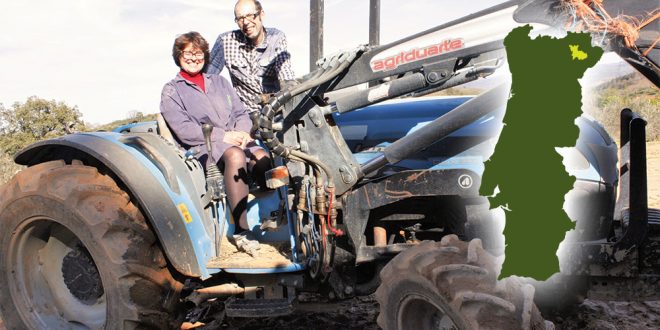Changing the mentality of their parents, who were reluctant to accept the prospect of five years with no profit in order to convert to wholly organic production, was just one of the mountains that the Mariano couple had to climb. They had already conquered other steep slopes. The first was when they decided to swap the comfort of the capital Lisbon to return to their roots in Macedo de Cavaleiros, after an extremely violent robbery perpetrated on the parents of 47-year-old Raquel Mariano, a theologian who has become a farmer since she returned to her starting point in 2012.
Giving the elderly family support and security on the one hand, and seeking quality of life on the other, by putting their faith in agriculture, the rearing of free-range chickens and the running of a small family restaurant, was the reason for Raquel and Miguel returning to Quinta do Melro, some 20 kilometres from Macedo de Cavaleiros. Four years later, the profits are just spiritual, as Raquel explains: “There is spiritual profit and psychological profit, but monetary profit only with a lot of financial gymnastics. It’s grain by grain”, she says, not wanting to disclose the turnover they have achieved during the last four years devoted to agriculture.
The land in Trás-os-Montes has never been easy; it has always required a lot of sweat and dedication, but the reward is normally products of great quality. The production of chestnuts, almost all for export – 90% to Italy, Miguel says – and of olive oil, almost all for the domestic market, is the bedrock of the business. The last major investment was planting more than 1,000 olive trees; they are young, two-year-old trees, but next autumn they will join their two thousand older sisters in the production of olives, which the Macedo de Cavaleiros Cooperative turns into olive oil, “the petroleum of Trás-os-Montes,” as 41-year-old Miguel Mariano calls it. They have a total of twelve hectares of olive trees.
During the last season, olive production fell to ten tonnes following a storm at the end of September, which destroyed 40% of the crop. “For 2017, we estimate that production will increase to 20 tonnes, but everything depends on the weather,” the businessman and farmer predicts. Chestnut production in 2015 was about two tonnes, but this year the figure is still unknown. “We will only know in the summer,” says Miguel Mariano, recalling an old belief according to which, if the sky is not cloudy in the first week of August, it will be a “good year for chestnuts”.
The Mariano family is practically self-sufficient in food, because around 80% of what they consume is produced on their own land. “I only need to buy pasta, rice, fish and some meat,” says Raquel, pointing out that the seeds they sow on their land are traditional ones that come from the family and are passed on from year to year. In the fruit and vegetable sector, the Marianos supply themselves with potatoes, sweet potatoes, apples, pears, peaches, persimmons and tomatoes. Haricot beans, red beans, leeks, onions, squash, aubergine, beetroot, cabbage, turnips, turnip greens and lentils also queue up to get to the Marianos’ table. All produced by themselves.
No herbicides are used on the farm, but pesticides are still used. Raquel Mariano says that it wasn’t easy to persuade her father to convert to 100% organic production, mainly because, during the transition period, it takes approximately five years for natural methods to overcome the pests and diseases that normally hamper profits during these initial years.
As is the case with most farmers, the Marianos have no idea about the emissions they produce, about the ecological footprint that agricultural and poultry production cause, but they believe that they largely compensate for this with thousands of trees, which include dozens of fruit trees, notably the blossoming cherry trees at this time of the year, as well as the olive and chestnut trees and a pine wood.
While selling baby ducklings and five-week-old free range chicks, Raquel tells ECO 123 that composting is a normal practice on their land and that no herbicides or fertiliser are used on her personal vegetable plot. “We use natural salt and ash, which we have been keeping since the beginning of winter,” says the “hurricane woman”, as Miguel likes to call her; he is full of pride for the companion he chose to marry in August 2008. “You see, she is an academically trained theologian out of passion, and she was a teacher of Moral Education and Catholic Religion for 17 years,” he says, overflowing with tenderness.
Less environmentally friendly, of course, is the poultry business, which is advertised on a board saying “free-range chickens for sale”. Free-range chickens come in the form of chickens, but there are also ducks, geese, guinea fowl and quails, all raised in the old-fashioned way in coops with a lot of freedom of movement; they feed from the ground and Miguel Mariano assures us that they “leave the ground naturally ploughed”.
Raquel Mariano admits that the poultry business is in decline, because younger people are not in the habit of buying live animals, which could also turn out to be an opportunity for implementing the couple’s most ambitious project, the construction of an ecological resort. The project to create an ecological “albergue” is already outlined and the investment is in the order of three million euros. “We just need one or more investors,” says Miguel; he believes that his property has huge potential for tourism because it is located in the heart of the Terras de Cavaleiro Geopark, classified by UNESCO in 2014.
Throughout the farm, the Marianos spend around 4,000 euros per year on electricity. They also spend 9,000 euros on diesel fuel for their own vehicles, cars, vans, agricultural machines and heating, and another 3,500 euros on propane gas. As long as there are no investors and as long as the financial support from the programme Portugal 2020 is an unknown quantity, the Marianos manage the farm in accordance with the three Rs: reducing environmental damage, reusing and recycling, says Raquel.
 Restaurante Novo Mariano
Restaurante Novo MarianoBrings fresh shellfish to Trás-os-Montes
The Marisqueira Novo Mariano is an iconic restaurant in the city of Macedo de Cavaleiros, because it offers clients fresh shellfish from the Algarve and Ericeira and has even won the first prize of the Geoparque Terras de Cavaleiro 2015 Gastronomy Festival with the “Geoprato Mariscada Varisca”, a rich shellfish dish that is as diverse as the European Variscan Belt, the geological region where this Trás-os-Montes restaurant is located. Shellfish lovers can savour lobster, crab, coastal prawns, whelks, periwinkles, gooseneck barnacles, and fried “canavilhas” and prawns.
The European Variscan Belt came into being through the collision between two continents some 300 million years ago, and is known by geologists as the “navel of the world” because it displays traces of two continents and an ocean that disappeared long before the dinosaurs and which was the result of a collision of continental masses that formed a range of mountains.
The Terra de Cavaleiros Geopark is the fourth area to be classified as a geopark in Portugal.
The Trás-os-Montes municipality of Macedo de Cavaleiros entered the 700-square-kilometre Terras de Cavaleiro Geopark for the European and global geopark network, and won the UNESCO denomination on 23rd September 2014.
 Eco123 Revista da Economia e Ecologia
Eco123 Revista da Economia e Ecologia


